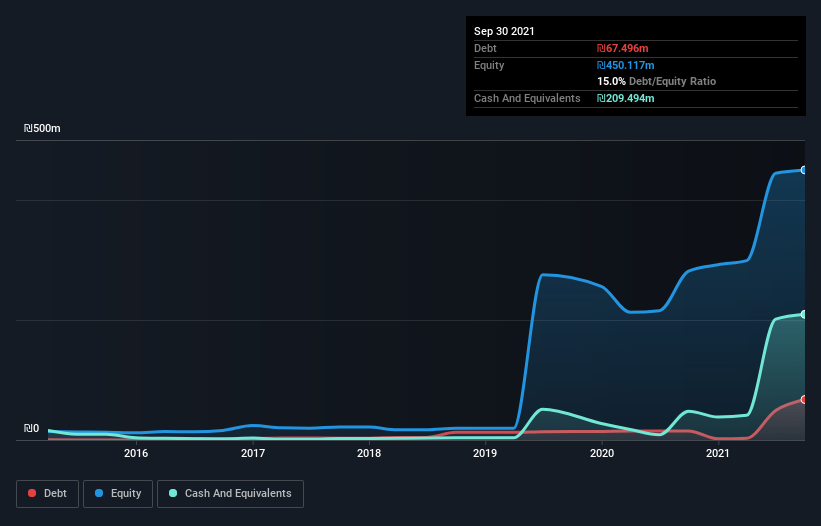Legendary fund manager Li Lu (who Charlie Munger backed) once said, 'The biggest investment risk is not the volatility of prices, but whether you will suffer a permanent loss of capital.' When we think about how risky a company is, we always like to look at its use of debt, since debt overload can lead to ruin. We can see that InterCure Ltd. (TLV:INCR) does use debt in its business. But the more important question is: how much risk is that debt creating?
When Is Debt Dangerous?
Debt and other liabilities become risky for a business when it cannot easily fulfill those obligations, either with free cash flow or by raising capital at an attractive price. Part and parcel of capitalism is the process of 'creative destruction' where failed businesses are mercilessly liquidated by their bankers. However, a more frequent (but still costly) occurrence is where a company must issue shares at bargain-basement prices, permanently diluting shareholders, just to shore up its balance sheet. Of course, the upside of debt is that it often represents cheap capital, especially when it replaces dilution in a company with the ability to reinvest at high rates of return. When we think about a company's use of debt, we first look at cash and debt together.
Check out our latest analysis for InterCure
How Much Debt Does InterCure Carry?
As you can see below, at the end of September 2021, InterCure had ₪67.5m of debt, up from ₪14.9m a year ago. Click the image for more detail. However, its balance sheet shows it holds ₪209.5m in cash, so it actually has ₪142.0m net cash.

A Look At InterCure's Liabilities
We can see from the most recent balance sheet that InterCure had liabilities of ₪164.4m falling due within a year, and liabilities of ₪41.1m due beyond that. Offsetting this, it had ₪209.5m in cash and ₪50.5m in receivables that were due within 12 months. So it actually has ₪54.5m more liquid assets than total liabilities.
This surplus suggests that InterCure has a conservative balance sheet, and could probably eliminate its debt without much difficulty. Simply put, the fact that InterCure has more cash than debt is arguably a good indication that it can manage its debt safely.
Although InterCure made a loss at the EBIT level, last year, it was also good to see that it generated ₪24m in EBIT over the last twelve months. The balance sheet is clearly the area to focus on when you are analysing debt. But ultimately the future profitability of the business will decide if InterCure can strengthen its balance sheet over time. So if you're focused on the future you can check out this free report showing analyst profit forecasts.
But our final consideration is also important, because a company cannot pay debt with paper profits; it needs cold hard cash. InterCure may have net cash on the balance sheet, but it is still interesting to look at how well the business converts its earnings before interest and tax (EBIT) to free cash flow, because that will influence both its need for, and its capacity to manage debt. During the last year, InterCure produced sturdy free cash flow equating to 74% of its EBIT, about what we'd expect. This cold hard cash means it can reduce its debt when it wants to.
Summing up
While it is always sensible to investigate a company's debt, in this case InterCure has ₪142.0m in net cash and a decent-looking balance sheet. And it impressed us with free cash flow of ₪17m, being 74% of its EBIT. So is InterCure's debt a risk? It doesn't seem so to us. The balance sheet is clearly the area to focus on when you are analysing debt. However, not all investment risk resides within the balance sheet - far from it. To that end, you should be aware of the 1 warning sign we've spotted with InterCure .
When all is said and done, sometimes its easier to focus on companies that don't even need debt. Readers can access a list of growth stocks with zero net debt 100% free, right now.
New: AI Stock Screener & Alerts
Our new AI Stock Screener scans the market every day to uncover opportunities.
• Dividend Powerhouses (3%+ Yield)
• Undervalued Small Caps with Insider Buying
• High growth Tech and AI Companies
Or build your own from over 50 metrics.
Have feedback on this article? Concerned about the content? Get in touch with us directly. Alternatively, email editorial-team (at) simplywallst.com.
This article by Simply Wall St is general in nature. We provide commentary based on historical data and analyst forecasts only using an unbiased methodology and our articles are not intended to be financial advice. It does not constitute a recommendation to buy or sell any stock, and does not take account of your objectives, or your financial situation. We aim to bring you long-term focused analysis driven by fundamental data. Note that our analysis may not factor in the latest price-sensitive company announcements or qualitative material. Simply Wall St has no position in any stocks mentioned.
About TASE:INCR
InterCure
Engages in the research, cultivation, production, marketing, and distribution of pharmaceutical-grade cannabis and cannabis-based products for medical use in Israel and internationally.
Excellent balance sheet with low risk.
Similar Companies
Market Insights
Community Narratives




